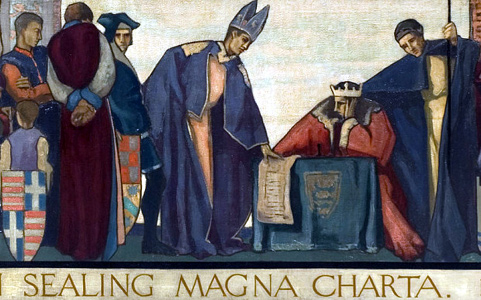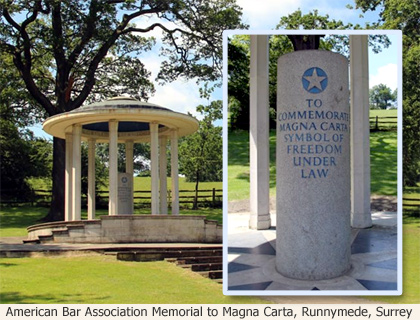June 15th is the 800th anniversary of that pivotal moment in Western Civilization when the law of the land was formally recognized as being above the will of the monarch. We who live in the historical wake of the British Empire have essentially enjoyed eight centuries of liberty as a result of King John’s reluctant signing of (the) Magna Carta.
Daniel Hannan (British member of the European Parliament for the Conservative Party) recounted the history of the “Great Charter” in a recent WSJ article ~
It was at Runnymede, on June 15, 1215, that the idea of the law standing above the government first took contractual form. King John accepted that he would no longer get to make the rules up as he went along. From that acceptance flowed, ultimately, all the rights and freedoms that we now take for granted: uncensored newspapers, security of property, equality before the law, habeas corpus, regular elections, sanctity of contract, jury trials […]
The bishops and barons who had brought King John to the negotiating table understood that rights required an enforcement mechanism. The potency of a charter is not in its parchment but in the authority of its interpretation […]
Magna Carta instituted a form of conciliar rule that was to develop directly into the Parliament that meets at Westminster today. As the great Victorian historian William Stubbs put it, “the whole constitutional history of England is little more than a commentary on Magna Carta.”
As the UK Telegraph points out, King John was one evil bast**d. Treacherous, lecherous, cruel and feckless (remind you of anyone?) – he couldn’t even manage to hold on to previously conquered land on the continent. Then he over-taxed the English citizenry to coverage the cost of his incompetence. He was such a disastrous ruler that his subjects finally rebelled openly and seized London. The King eventually had no choice but to sign the Great Charter which put the law of the land above his own despotic will.
The significance of Magna Carta is hard to overstate. The assertion that common law should supplant the arbitrary whims of a ruler, transformed western civilization ~
When the 18th-century statesman Pitt the Elder described Magna Carta as England’s Bible, he was making a profound point. It is, so to speak, the Torah of the English-speaking peoples: the text that sets us apart while at the same time speaking truths to the rest of mankind.
The very success of Magna Carta makes it hard for us, 800 years on, to see how utterly revolutionary it must have appeared at the time. Magna Carta did not create democracy: Ancient Greeks had been casting differently colored pebbles into voting urns while the remote fathers of the English were grubbing about alongside pigs in the cold soil of northern Germany. Nor was it the first expression of the law: There were Sumerian and Egyptian law codes even before Moses descended from Sinai.
What Magna Carta initiated, rather, was constitutional government—or, as the terse inscription on the American Bar Association’s stone puts it, “freedom under law.” […]
The idea of the law coming up from the people, rather than down from the government, is a peculiar feature of the Anglosphere. Common law is an anomaly, a beautiful, miraculous anomaly. In the rest of the world, laws are written down from first principles and then applied to specific disputes, but the common law grows like a coral, case by case, each judgment serving as the starting point for the next dispute. In consequence, it is an ally of freedom rather than an instrument of state control.
Seeds of freedom and liberty that we Americans have come to take for granted, were planted on that long ago day in June. Our heritage compels us to stand up to tyrants, demand an end to arbitrary rule, and assert our rights under the law.
LEX REX!






